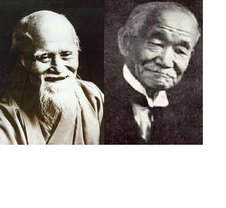Wednesday, May 6, 2009
Probabilities
Last night one of my students made a comment about using Aikido against an attacker with a knife and how you'd be safe as long as you used Aikido. When I commented "well, you'd be safe-ER" I got some questioning looks. In Aikido we train to prevail and increase our odds of safely getting out of a confrontation. We're never 100% sure we'll be fine, and that's especially true when someone has something lethal, like a knife. Even untrained, someone with a knife has a VERY good chance of cutting and/or stabbing you. We try to lessen their chances and increase our own by training in avoidance, having a good understanding of mai, and maintaining balance. I could see the disillusionment setting in. In martial arts we get this idea of being invincible due to getting a sort of tunnel vision thanks to training. We think "well this works in class and I can do this" but somehow this translates into our brains as "this works and as long as I do this I can never be hurt". I'm not saying confidence isn't good to have, I'm just saying that we need to think about our goals. If our goal is to "take this knife away from this guy and walk away without a scratch" that's a hard goal to meet. Now if it's something closer to "I want to survive this" or "I want to get away" that's something much more attainable and realistic. This is also why I keep telling students not to try to make a specific move work. When you do that, you have a habit to foget about everything else you can do also. This post came out sounding more pessimistic than I'd hoped but hopefully I've explained myself well enough to get my ideas across to you guys.
Subscribe to:
Post Comments (Atom)



2 comments:
RIGHT ON! You sound like you had a truly great teacher!!! ;-)
There is an interesting balanc between disillusioning your students and presenting realistic ideas.
Modern training gurus say there are three domains of learning - cognitive, psychomotor, and affective. Cognitive is knowing head more head knowledge. Psychomotor is having more or better actual skills. Affective is feeling better about your knowledge and skills and abilities. You want every class to improve all three domains some.
But you don't want to turn into some sort of kool-aid drinking cult with kumbayah haleleuia meetings instead of realistic, training.
You are right on when you say that we have to work in the realm of probabilities instead of the realm of possibilities!
I did have a pretty good teacher.
Post a Comment